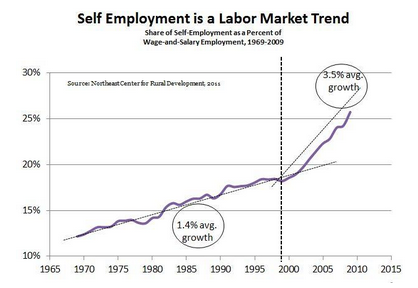Vonita Murray, a veteran from the 1st Gulf War, spent over ten years working in office management before becoming a CAD Technician. She was working at an architecture firm, when she was laid off in 2009. It was the push she needed to follow her passion. She grew up in Colorado on three-acres with a huge garden and lots of animals.
In early 2011, without a formal education in farming, she leased four acres of land on which she grows a variety of vegetables, fruits and flowers, including green cauliflower, yellow strawberries and purple carrots. A couple of months later she learned about Farmer Veterans Coalition (FVC) who helped her learn about large scale crop production as well as helped build a 1000 square foot hoop house, or greenhouse. She wants to diversify and grow as many different crops as she can manage. She operates an 8-member small Community Supported Agriculture from her farm and has plans to grow it to 50 members.
Businesses, like Vonita's, with five or fewer employees -- micro-businesses -- are the new normal and they are the new job creators.
If President Obama is as serious about job creation as his State of the Union speech indicated, then he needs to foster policies that create more businesses and recognize that self-employment and micro-business is job creation.
We need good strategies to help these businesses start and thrive and we need to broaden the spectrum of businesses that current policy purports to help. What start-up businesses need to succeed is business coaching, mentoring, management training skills, small amounts of capital and connections to markets.
The Bureau of Labor statistics reported in March that the average size of new start-ups was 4.7 employees in 2011 -- that's down from 7.6 employees in the 1990s. And the share of the self-employed in the labor market is growing exponentially (see graph below). And the trend is expected to continue. Whether it's the technological gains that allow high productivity or the disappearance of the 'safe corporate job', the reality is that businesses are starting smaller (and perhaps staying smaller).

Despite the real trend toward self-employment and micro-business, most efforts to help entrepreneurs are focused on high growth businesses. Everyone wants to be the next Facebook, but only 1 percent of those businesses will actually scale.
Sure, everyone needs their celebrities, but most of us are regular people. The same is true of business; 99 percent of businesses will not grow to be superstars and employ thousands, 88 percent of those won't grow past five employees.
CAMEO, California Association for Micro Enterprise Opportunity, has been creating jobs since its inception in 1993 by helping people to create their own job. Our mission is to grow a healthy, vibrant, thriving environment for all entrepreneurs and start-up businesses by advancing the work of our statewide member network.
Our member organizations provide the entire spectrum of entrepreneurs with small and micro-business financing, technical assistance and business management training. In 2011, CAMEO members served 21,000 very small businesses that supported or created 37,000 new jobs in California and generated $1.3 billion in economic activity. This success is possible because of a continuum of business services exists within our network. Businesses that receive assistance have an 80 percent success rate as compared with the 50 percent to 80 percent mortality rate for small businesses overall.
Our efforts and those of our members need solid, sustainable support. The cost of job creation through micro-business development is about $3,000 per job, according to the Aspen Institute. Public infrastructure projects and corporate incentives usually cost around $100,000 per job. With less than three percent of the money, micro-businesses employ more people than venture capital firms. As a job creation strategy, micro-business development is very cost effective.
If Congress were serious about helping small business, it would do something that will really help the majority of small businesses -- support business start-ups with business assistance and microloans. They could do that by funding the SBA PRIME Program, the Microloan Technical Assistance programs, Women Business Centers, and Small Business Development Centers at their 2010 levels. A relatively small investment in these programs provide big returns in terms of job creation and economic growth. Also policy makers at the state and federal levels need to break down barriers to and remove penalties of self-employment. Big corporation can make a commitment to do a percentage of their business with their local small businesses. And we as consumers can make every day Small Business Saturday.
To create jobs, we need strategies that will harness the entrepreneurial spirit of all small business and cultivate homegrown local businesses.
